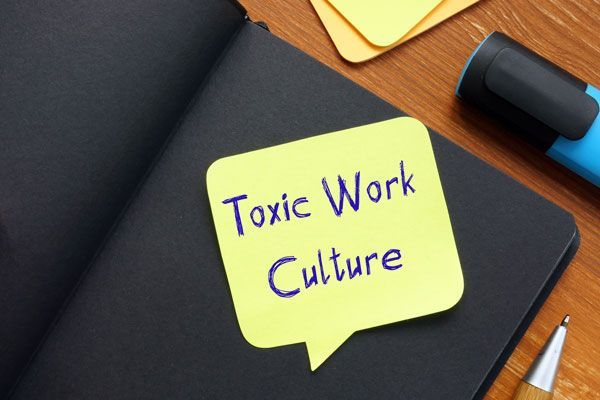Tips for Surviving a Toxic Work Environment
Why ARE Workplace DYNAMICS Important?
Recently I have had several clients attend my sessions who wanted to discuss various stressful situations that they are experiencing in their workplace.
Although they are reasonably content with their current career, the workplace dynamics has played a major factor in their considering transitioning from a role that they previously enjoyed to seek new opportunities.
Most workplaces have challenges, but a toxic work environment can erode your self-confidence, increase anxiety and depression and can have a very negative effect on your work performance, health and relationships away from work.
This checklist can help you determine if your workplace is unhealthy for you.
1. You may be experiencing Burnout
Toxic work environments often overloads you with work, unrealistic timelines and negative thoughts that can continue well after you leave work each day, this impacts your ability to relax and may even effect your sleep. You can find yourself working much harder and for longer to impress others or show your true value but your efforts go unnoticed. This in time can cause burnout because your job is continually challenging on multiple levels, and due to the environment may limit any chance of personal growth or promotion.
2. You may struggle with managing Work-Life Balance
A balance between your personal life and work is essential to help you stay healthy, productive and interested in your work environment. Toxic jobs often disempower you and even when you know a holiday or few days off is much needed you may feel pressure to stay at work in fear of losing ground within the business or organisation, or your boss or colleagues causing more issues for you when you return.
3. Communication amongst colleagues is poor.
A positive and supportive work place promotes effective communication, where as a toxic workplace may have insufficient and poor and infrequent forms of communication.
You may find yourself being excluded from critical information by bosses and colleagues. Your boss may give little to no feedback, or they may only comment on your performance when they were not pleased with it. You might receive instructions or projects which have minimal details, absence of clarity around situations, and many employees receiving different messages. This poor leadership and communication style can quickly cause rifts to occur within teams and create a toxic work environment.
4. You notice Cliques developing
There may be colleagues who ignore, exclude, bully, and gossip about you or others. They have inside jokes, share meals and take breaks together, and alienate everyone else. However, when they need something from you, they’re surprisingly friendly until your project is done, and they move on. Unfortunately, dealing with cliques cannot be avoided if you want to survive a toxic workplace.
5. Poor Leadership
Having a toxic boss is a significant characteristic of a toxic workplace. A toxic boss may shout at you and insult you or be passive-aggressive for no reason. They may also expect you to work long hours without extra pay, offload their personal lives on you, take you for granted, take credit for your achievements and contact you outside office hours. Some bosses may send emails at midnight and expect immediate responses, while others may call you and expect that you pick up immediately. These bosses don’t demonstrate boundaries, respect to you or that they value you in any way.
6. High Employee Turnover
There may be a steady stream of past colleagues who have resigned from their positions, generally this is an indication of an ongoing toxic work environment. Employees may be willing to work at an office long enough to gain critical skills, complete current study commitments, or develop good networks as they develop an exit plan.
This checklist can help Teach you How to Survive a Toxic Workplace
Whether you like playing office politics or not, it is a part of the work reality. Success in your workplace often depend on the strategies you can develop to cope with the toxicity and the number of positive relationships you can nurture in the workplace.
1. Aim to be nice to everyone
Try to fit in and be a good team member if it is possible, be helpful and friendly and don’t get involved with gossip or negative discussions. Be aware of colleagues who aren't nice and make the workday miserable, who resist any suggestions you make and sabotage any projects you do.
2. Don't be a complainer – look for solutions
Anybody can point out problems - employees worth having around are the ones that keep them from happening in the first place, or solve them quickly when they appear. The ones who are able to make light of a situation, no matter how dire it is, win bonus points for being able to relieve tension.
3. Don't Hide
Try to be insight of others, highly visible so they are aware you are around, and you are actively working well and being a team member. If you withdraw others may take advantage of this and suddenly you're blamed for everything that's gone wrong, and you're never responsible for anything that has gone right.
4. Encourage good communications with your Boss
Your boss is the one person who is in the best position to determine your future in the workplace. Aim to develop a good working relationship with them, keep them informed of changes or offer ideas for them to consider and ensure communication is productive.
5. Be good at what you do
Work smart. Use everything as a learning opportunity. Don't be late for work, and don't abuse time off. Your colleagues will use any weakness as a cause for resentment, so don't give them any. Just be great at what you do.
6. Be Polite
Try to avoid sarcasm and caustic humour in the workplace, and always be as courteous as possible. Be gracious and humble.
7. Be wise ensure you protect yourself from sabotage
You may choose to save all emails that outline your ideas, record how you contributed on a project and which tasks you've done. Compile basic evidence and documentation of difficult work relationships or awkward situations you are experiencing – these can be used to back you up if ever needed.
Office politics are certainly not enjoyable, but you will be more successful navigating them if you follow these 7 tips.
You can try these suggestions to help cope with A TOXIC WORKPLACE situation
In regards to your personal care, it is important to develop some strategies to minimise the erosion of your self-confidence and help you to build on your resilience. While in some cases it may be easier to remove yourself from a toxic workplace by seeking new employment that is not always possible. Unfortunately too often Managers / Leaders avoid taking any action to eliminate toxicity when you bring the situation up with them, often ignoring the issues caused by toxic people in the workplace.
1. Establish boundaries
While it is hard to set boundaries and say no, it is critical to do so in a toxic work environment. Write down clear and concise boundaries, such as taking your lunch break, not coming in early or staying late, not working on the weekends, or not responding to your boss at all hours of the day. Remember your boundaries and stick to them.
2. Create a positive workspace
While you may not be able to control or influence very much in your work environment, you usually can decide how to decorate your workspace. If you are allowed hang relaxing posters on your walls, or framed pictures of people you love and positive quotes and affirmations were you can see them often. Remind yourself that your job is not everything and that you have a happy life and good relationships when not at work.
3. Try not to take negativity home with you
While your workplace may be filled with negativity, have a strategy for transitioning to a more positive outlook before you arrive home in the evening. You may go to the gym and do a class or workout before going home, you may go for a coffee or catch up with friends after work, or find a peaceful place to meditate so you can clear your mind of negative feelings.
4. Seek social support
Find a supportive friend who will let you vent and release pent up frustration. Let your friend know that you don’t need a problem solver, just a safe space to talk and share your thoughts. Maintain a healthy balance when with your friend to also include positive activities which involves fun and laughter so you don’t burn out your friend.
5. Stay true to yourself
Try to maintain your real personality, and resist being drawn into acting badly because others are. Remind yourself of your core values, what motivates you to do this type of work or role, and stay on the high road. Stay alert and recognise if people are trying to manipulate you into following them or isolating others.
6. Remember that your job isn’t everything
Avoid associating your happiness and self-worth only with your job. Your career is important, but so are family, friends, physical health, mental health, hobbies, your residence, and your community engagement. When things are not going well at work, focus on building up the parts of your life outside of work so that unhappiness with work will not dominate your feelings about life in general.
7. And if it is still effecting you - Develop an Exit Plan
Working in a toxic environment can motivate you to take steps for transitioning to a higher level at the same workplace, seeking promotion or a transfer. Or you may do a skills audit, revise your resume and research any gap skill training needs in preparation for applying for a new position with a different employer. Try using your time wisely when at your current toxic work environment to develop your skills on the job and with formal training, make valuable contacts internal and external and nurture these to maintain good networks. Also record all relevant and complex experience gained whilst enduring the workplace you plan to escape from – ‘when you are ready’. Turn a negative into positive.
Remember that you are working towards a much bigger plan in life, you have set yourself SMART Goals: Specific - Measurable - Achievable - Relevant - Time-bound
Sometimes this makes it much easier to endure because you are aiming for an improved future and not concentrating on the day to day toxic environment of your current workplace.












